第三部分 透视国际传播 5:国际传播体系
国际传播学理论体系综述
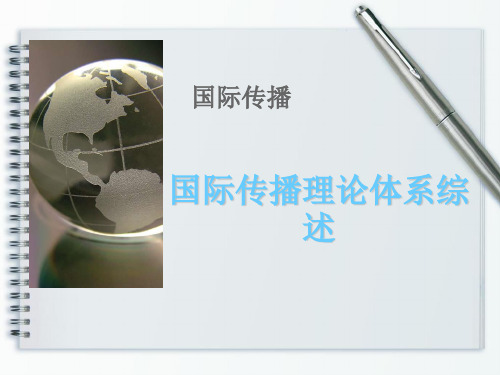
国际传播理论体系综 述
国际传播体系
• 各国的媒体体系、各国政治和政府之间的 关系 • 涉及各国政治体制和政治理念
几种理论:
• • • • • •
1、施拉姆等四种理论 2、哈希顿的五种理论 3、阿特休尔三个世界 4、卡尔· 诺登斯特伦五种范式 5、丹尼斯· 麦奎尔民主参与理论 6、罗伯特· 皮卡德民主社会主义理论
• The Tudors and Stuarts maintained that the press belonged to the office of king and therefore was obligated to support the royal policy. Only by special permission was private ownership of the press permitted, and this permission could be withdraw any time the obligation to support the royal policies was considered to have been dishonored. Publishing was thus a sort of agreement between power source and publisher, in which the former granted a monopoly right and the latter gave support. But the power source kept the right to set and change policy, the right to license, and in some cases the right to censor.
传播学细分专业介绍
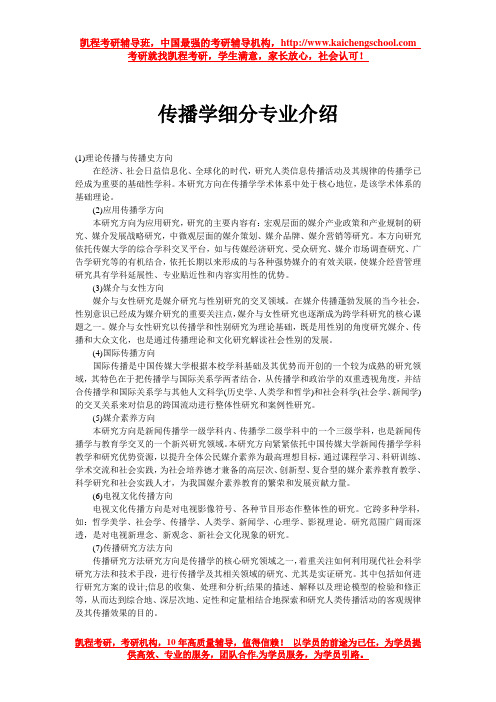
传播学细分专业介绍(1)理论传播与传播史方向在经济、社会日益信息化、全球化的时代,研究人类信息传播活动及其规律的传播学已经成为重要的基础性学科。
本研究方向在传播学学术体系中处于核心地位,是该学术体系的基础理论。
(2)应用传播学方向本研究方向为应用研究,研究的主要内容有:宏观层面的媒介产业政策和产业规制的研究、媒介发展战略研究,中微观层面的媒介策划、媒介品牌、媒介营销等研究。
本方向研究依托传媒大学的综合学科交叉平台,如与传媒经济研究、受众研究、媒介市场调查研究、广告学研究等的有机结合,依托长期以来形成的与各种强势媒介的有效关联,使媒介经营管理研究具有学科延展性、专业贴近性和内容实用性的优势。
(3)媒介与女性方向媒介与女性研究是媒介研究与性别研究的交叉领域。
在媒介传播蓬勃发展的当今社会,性别意识已经成为媒介研究的重要关注点,媒介与女性研究也逐渐成为跨学科研究的核心课题之一。
媒介与女性研究以传播学和性别研究为理论基础,既是用性别的角度研究媒介、传播和大众文化,也是通过传播理论和文化研究解读社会性别的发展。
(4)国际传播方向国际传播是中国传媒大学根据本校学科基础及其优势而开创的一个较为成熟的研究领域,其特色在于把传播学与国际关系学两者结合,从传播学和政治学的双重透视角度,并结合传播学和国际关系学与其他人文科学(历史学、人类学和哲学)和社会科学(社会学、新闻学)的交叉关系来对信息的跨国流动进行整体性研究和案例性研究。
(5)媒介素养方向本研究方向是新闻传播学一级学科内、传播学二级学科中的一个三级学科,也是新闻传播学与教育学交叉的一个新兴研究领域。
本研究方向紧紧依托中国传媒大学新闻传播学学科教学和研究优势资源,以提升全体公民媒介素养为最高理想目标,通过课程学习、科研训练、学术交流和社会实践,为社会培养德才兼备的高层次、创新型、复合型的媒介素养教育教学、科学研究和社会实践人才,为我国媒介素养教育的繁荣和发展贡献力量。
国际传播复习资料

1.国际传播的定义广义:跨越国界的大众传播和人际传播 。
具体而言,即政府、企业、组织、个人进行的跨越国界的信息传递过程。
狭义:跨越国界的大众传播。
2.国际传播与跨文化传播的区别和联系区别:一、研究范围不同:国际传播是国与国之间越过地理的国境线的信息交流过程,文化基本相同的两个国家之间的信息交流是国际传播;文化相同的信息发送者和接收者处于不同国家时,其交流也是国际传播。
跨文化传播是不同文化背景人们之间信息交流过程。
二、学术渊源不同:国际传播起源于国际政治和国际关系的研究;跨文化传播起源于文化人类学。
联系:一、研究范围有交叉:跨文化传播要考虑国际关系因素,国际传播也要注意跨文化的因素。
二、二者互相依存:无论是通过大众媒介还是人际交流渠道,跨国的传播通常是一种跨文化传播。
三、二者的研究方向正在靠拢:随着经济全球化的加速,跨国公司的增多和发展,跨文化传播的研究逐渐向组织机构间的跨文化交流,向国与国之间的跨文化交流扩展,从微观向宏观方面发展。
而国际传播的研究也开始从大众传播向人际传播发展,即观察的角度从宏观走向微观。
两者关系日益密切。
3.20世纪60、70年代国际传播的发展研究现代意义上的国际传播,主要是十九世纪电子媒介产生以后。
20世纪60年代末,国际传播在美国成为一个研究的学术领域得到承认。
加拿大对国际传播的研究比较多。
这方面最具代表性的是1964年,麦克卢汉出版的《理解媒介:论人的延伸》提出“地球村”和“信息时代”的概念。
1969年,联合国教科文组织在加拿大蒙特利尔召开传家会议,会上发送的出版物和会后发表的“关于船舶研究国际项目的建议”,被普遍成为国际传播研究的分水岭。
它注意到了“信息自由传播原则”加剧了信息富国和信息穷国之间的不平等。
20世纪70年代,一批在50-60年代摆脱殖民统治的亚非国家(不结盟国家)在要求建立国际经济新秩序之外,还要求建立国际信息与传播新秩序。
1973年9月在阿尔及尔召开的第四次不结盟国家首脑会议,提出“关注大众传播领域里的工作”,以“促进不结盟成员国之间的信息的进一步相互交流”。
新时代中国国际传播话语体系的主要内容

【新时代我国国际传播话语体系的主要内容】一、概述随着我国的崛起和国际地位的不断提升,我国的国际传播话语体系也逐渐走向世界舞台。
在新时代背景下,我国的国际传播话语体系有着许多新的特点和主要内容。
本文将针对这一话题展开分析,以探讨新时代我国国际传播话语体系的主要内容。
二、我国国际传播话语体系的内涵和特点1. 文化自信的凸显我国国际传播话语体系在新时代更加注重文化自信的凸显。
我国传媒产品和传播渠道在国际舞台上积极展现我国文化特色和价值观念,增强了国家文化软实力,提升了国际传播的影响力和吸引力。
2. 多元话语的融合我国国际传播话语体系在新时代不再是单一的传播形式,而是融合了多元的传播方式和媒体评台。
传统媒体、新媒体、社交媒体以及国际社交网络等多种传播渠道相互交织,形成了立体、多元的传播格局。
3. 和平发展理念的践行我国国际传播话语体系在新时代更加注重和平发展理念的践行。
我国始终秉持和平、合作、共赢的外交理念,通过国际传播宣传国家对外政策,促进国际社会的和平稳定和共同发展。
4. 制度优势的展示我国国际传播话语体系在新时代将我国的制度优势作为传播的重要内容之一。
我国特色社会主义制度的优越性和成功经验被积极宣传和展示,为国际社会了解我国提供了更多的参考和思考。
5. 全球视野的拓展我国国际传播话语体系在新时代积极拓展了全球视野,增强了对外报道的国际化视角。
我国传媒加大了对国际事务的报道力度,让世界更加全面地了解我国、认识我国。
6. 共生共荣的倡导我国国际传播话语体系在新时代更加倡导共生共荣的理念,强调世界各国在全球化进程中应当相互尊重、平等相待、互利共赢。
通过国际传播,传递我国对全球命运共同体的理解和追求。
7. 信息传播的开放与透明我国国际传播话语体系在新时代更加注重信息传播的开放与透明。
我国积极向世界传递我国的政策动向、社会变革和经济发展等方方面面的信息,增强了国际社会对我国的认知和理解。
8. 文化输出的创新我国国际传播话语体系在新时代不断创新文化输出模式,注重发挥我国文化的吸引力和影响力。
国际传播中的“全球化”与“世界化”——阿芒·马特拉的国际传播观

lgq ec mm ecaee o ivseC’s n o sbl6q i ep cel i 6e c ,o a o r o iu o r il tp s ii . e t ep siit u s e t adf rn ec mb tp u t t u i r
ls d o t o e r i a c mmu i u re r me t e s r i ep b i . e sa i a e lm e t ed v r i e s n q e t o u e v c u l I n ’g r p s s u e n i e s r p l c1 a d i f n s6 d s e l o o r e c mmu ia in e i e masd r p s r e u g si n i n fc t e o rl e d a n c t n Chn i ep o o e ss g e t s g i a i sp u o d o s i v a
马特拉认为之所以要批判地对待全球化原因在于全球化这个诞生于管理和市场营销领域并以经济整合为目的概念被用来指称一切文化产品和文化交换的国际化现象并试图用商业的服务和管理模式及逻辑对社会进行治理忽略了世界的真实复杂性以及经济和传播整合造成的社会排斥
N 7 。5
法 圆研 究( tds rnass Eu e F a g i ) e
4 tm. 0 9 。r 2 0 i
国际传播 中的 “ 全球化 ”与 世 界化” “
一
阿芒・ 马特拉 的国际传播观
朱振 明
摘要 :文章试从马特拉的著作入手 ,采用理论分析的方法展现其对国际传播的看法 , 透视 分 别 以商业文 化和启 蒙文化 为背 景 的 “ 传播 的全球 化 ”与 “ 传播 的世界 化 ”概 念 的差别 ,
关于国际传播的理论与实践
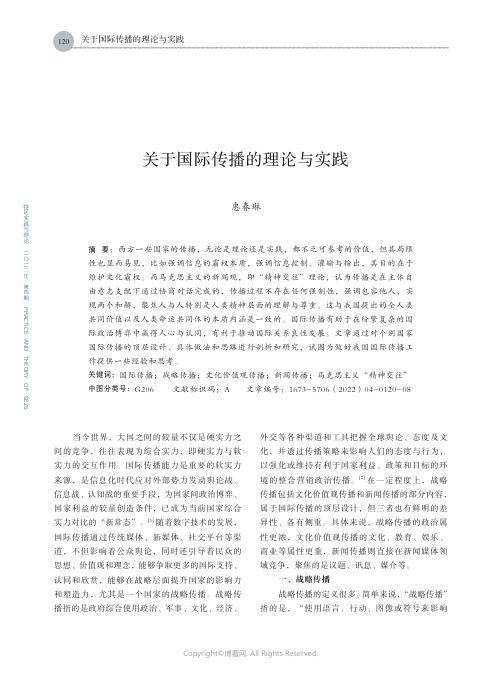
特区实践与理论二〇二二年第四期 PRACTICE AND THEORY OF SEZS当今世界,大国之间的较量不仅是硬实力之间的竞争,往往表现为综合实力,即硬实力与软实力的交互作用。
国际传播能力是重要的软实力来源,是信息化时代应对外部势力发动舆论战、信息战、认知战的重要手段,为国家间政治博弈、国家利益的较量创造条件,已成为当前国家综合实力对比的“新常态”。
[1]随着数字技术的发展,国际传播通过传统媒体、新媒体、社交平台等渠道,不但影响着公众舆论,同时还引导着民众的思想、价值观和理念,能够争取更多的国际支持、认同和欣赏,能够在战略层面提升国家的影响力和塑造力,尤其是一个国家的战略传播。
战略传播指的是政府综合使用政治、军事、文化、经济、外交等各种渠道和工具把握全球舆论、态度及文化,并透过传播策略来影响人们的态度与行为,以强化或维持有利于国家利益、政策和目标的环境的整合营销政治传播。
[2]在一定程度上,战略传播包括文化价值观传播和新闻传播的部分内容,属于国际传播的顶层设计,但三者也有鲜明的差异性、各有侧重。
具体来说,战略传播的政治属性更浓,文化价值观传播的文化、教育、娱乐、商业等属性更重,新闻传播则直接在新闻媒体领域竞争,聚焦的是议题、讯息、媒介等。
一、战略传播战略传播的定义很多。
简单来说,“战略传播”指的是,“使用语言、行动、图像或符号来影响关于国际传播的理论与实践惠春琳摘 要:西方一些国家的传播,无论是理论还是实践,都不乏可参考的价值,但其局限性也显而易见,比如强调信息的霸权本质,强调信息控制、灌输与输出,其目的在于维护文化霸权。
而马克思主义的新闻观,即“精神交往”理论,认为传播是在主体自由意志支配下通过协商对话完成的,传播过程不存在任何强制性,强调包容他人,实现两个和解,聚焦人与人特别是人类精神层面的理解与尊重。
这与我国提出的全人类共同价值以及人类命运共同体的本质内涵是一致的。
国际传播有助于在纷繁复杂的国际政治博弈中赢得人心与认同,有利于推动国际关系良性发展。
当前我国国际传播面临的问题与思考

重点话题INTERNA TIONAL COMMUNICA TIONS崔鹏 人民日报社办公厅国际传播能力建设处副处长王峰 人民日报社办公厅国际传播能力建设处处长当前我国国际传播面临的问题与思考当前,新冠肺炎疫情在全球持续蔓延,百年未遇之大疫情牵动百年未有之大变局,国际格局和全球治理体系加速演变。
西方不断升级负面议题,不遗余力对我攻击抹黑,加剧打压我媒体机构,我国国际传播能力建设面临更大压力、更新挑战。
新形势下,研究改进国际传播方式、提高对外传播的贴近性和有效性,成为一项重要而紧迫的任务。
一、当前国际传播存在的问题1.对传播对象的研究不够深入,精准性和贴近性不足。
对外传播一定要了解当地受众喜欢什么、想看什么,清楚他们的阅读习惯、风格偏好,实现精准传播、贴近传播,才能达到更好的传播效果。
但一些对外传播媒体往往习惯于沿用传统模式,不管不顾搞“大水漫灌”,经常出现“千稿一面”,甚至照搬照抄内宣报道,这种“眉毛胡子一把抓”、不分重点、没有层次的传播方式,很难达到理想的效果。
2.宣传味道过浓,政治色彩、意识形态色彩过于突出。
对外传播过程中,我国媒体大力宣传中国特色社会主义的道路、理论、制度和文化等,本是应有之义,但有的媒体往往喜欢站在自己的角度进行“灌输”,政治色彩过于突出,意识形态色彩过于明显,与境外舆论场格格不入。
突出表现在对外传播主题过多集中于重大议题、严肃话题,缺乏对普通人日常生活的描绘,造成“不食人间烟火”的效应,无法与海外受众形成共鸣。
①3.习惯“报喜不报忧”,正面报道和负面报道比例失调。
对外传播应致力于构建良好的国家形象,但在具体操作过程中被部分媒体片面理解为“报喜不报忧”,对我国发展过程中遇到的问题、矛盾,三缄其口、三言两语,给外界造成心态狭隘、不愿正视自己的印象。
社交媒体时代,这种“捂盖子”的处理方式只会“捅娄子”,单纯追求“正面报道”更可能带来“负面效应”。
事实上,对外传播更需要“正面效果”,而不是简单的“正面报道”。
日本的文化外交与NHK的国际传播策略

日本的“文化外交”与NHK的国际传播策略日本的NHK作为公营的媒体,不仅在报道新闻、服务社会方面有着重要的作用,同时在对外宣传与国家形象塑造方面负有重要的责任。
面对21世纪传播环境的变化,NHK大力强化内容建设与传播渠道整合,为其海外扩张奠定了坚实的基础。
一 NHK的国际传播架构NHK(Nippon Hoso Kyokai,日本广播协会)是日本唯一一家公共电视机构,其前身是1925年3月22日播出的东京广播电台,1926年8月20日与大阪广播电台和名古屋广播电台合并后,正式成为全国性广播电台组织。
从国际传播的角度来看,NHK所进行的国际传播实际上负有三重目的——政治上,配合日本政府的国家发展战略,展现不同时期日本的国家形象,表达日本的立场与观点;文化上,通过向世界传递日本文化、促进文化交流,以培养“亲日感”,强化对日本的认同;在经济上,通过传递日本文化,建构日本品牌,促进经济发展。
从组织架构来看,NHK的对外传播平台可以分为电视、广播与网络三个领域。
1.日本电视国际传播目前,NHK国际频道包括环球电视频道(NHK World TV)和环球收费频道(NHK World Premium)。
NHK World TV的前身是1995年4月3日利用北美TV Japan、欧洲JSTV频道时段开播的“NHK国际电视广播”(NHK International TV Broadcasting),后纳入“NHK环球广播网”而改称“NHK World TV”。
NHK World Premium与NHK World TV同时开播,主要以日语为旅居海外的日本人服务。
到2013年,NHK World TV覆盖130个国家和地区,1.5972亿户家庭。
2.日本国际广播电台日本国际广播电台开播于1935年,当时称为“日本海外广播”,使用英语和日语向北美西部和夏威夷地区播出。
“二战”后停播,1952年2月以“日本广播电台”之名重新开始对外广播。
国际传播视域下的依附理论研究综述
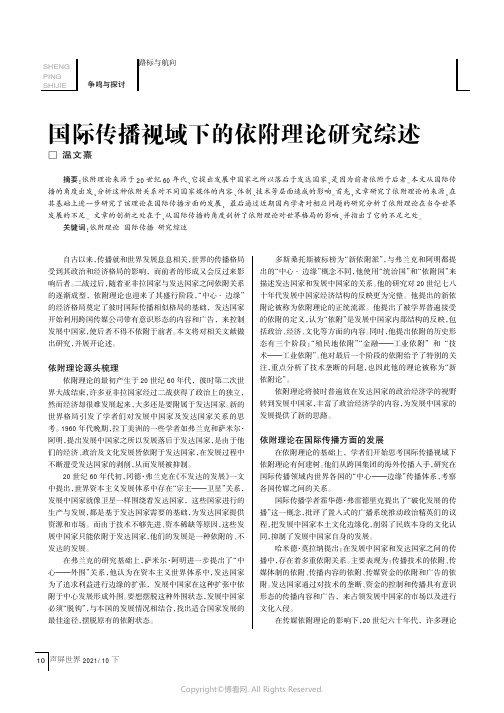
2021/10下自古以来,传播就和世界发展息息相关,世界的传播格局受到其政治和经济格局的影响,而前者的形成又会反过来影响后者。
二战过后,随着亚非拉国家与发达国家之间依附关系的逐渐成型,依附理论也迎来了其盛行阶段,“中心-边缘”的经济格局奠定了彼时国际传播相似格局的基础,发达国家开始利用跨国传媒公司带有意识形态的内容和广告,来控制发展中国家,使后者不得不依附于前者。
本文将对相关文献做出研究,并展开论述。
依附理论源头梳理依附理论的最初产生于20世纪60年代,彼时第二次世界大战结束,许多亚非拉国家经过二战获得了政治上的独立,然而经济却很难发展起来,大多还是要附属于发达国家。
新的世界格局引发了学者们对发展中国家及发达国家关系的思考。
1960年代晚期,拉丁美洲的一些学者如弗兰克和萨米尔·阿明,提出发展中国家之所以发展落后于发达国家,是由于他们的经济、政治及文化发展皆依附于发达国家,在发展过程中不断遭受发达国家的剥削,从而发展被抑制。
20世纪60年代初,冈德·弗兰克在《不发达的发展》一文中提出,世界资本主义发展体系中存在“宗主———卫星”关系,发展中国家就像卫星一样围绕着发达国家,这些国家进行的生产与发展,都是基于发达国家需要的基础,为发达国家提供资源和市场。
而由于技术不够先进、资本稀缺等原因,这些发展中国家只能依附于发达国家,他们的发展是一种依附的、不发达的发展。
在弗兰克的研究基础上,萨米尔·阿明进一步提出了“中心———外围”关系,他认为在资本主义世界体系中,发达国家为了追求利益进行边缘的扩张,发展中国家在这种扩张中依附于中心发展形成外围。
要想摆脱这种外围状态,发展中国家必须“脱钩”,与本国的发展情况相结合,找出适合国家发展的最佳途径,摆脱原有的依附状态。
多斯桑托斯被标榜为“新依附派”,与弗兰克和阿明都提出的“中心-边缘”概念不同,他使用“统治国”和“依附国”来描述发达国家和发展中国家的关系。
社交媒体平台中的共情传播:提升国际传播效能的新路径
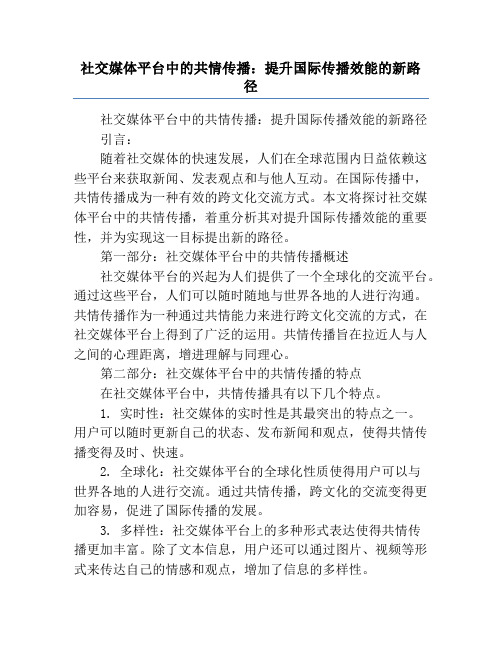
社交媒体平台中的共情传播:提升国际传播效能的新路径社交媒体平台中的共情传播:提升国际传播效能的新路径引言:随着社交媒体的快速发展,人们在全球范围内日益依赖这些平台来获取新闻、发表观点和与他人互动。
在国际传播中,共情传播成为一种有效的跨文化交流方式。
本文将探讨社交媒体平台中的共情传播,着重分析其对提升国际传播效能的重要性,并为实现这一目标提出新的路径。
第一部分:社交媒体平台中的共情传播概述社交媒体平台的兴起为人们提供了一个全球化的交流平台。
通过这些平台,人们可以随时随地与世界各地的人进行沟通。
共情传播作为一种通过共情能力来进行跨文化交流的方式,在社交媒体平台上得到了广泛的运用。
共情传播旨在拉近人与人之间的心理距离,增进理解与同理心。
第二部分:社交媒体平台中的共情传播的特点在社交媒体平台中,共情传播具有以下几个特点。
1. 实时性:社交媒体的实时性是其最突出的特点之一。
用户可以随时更新自己的状态、发布新闻和观点,使得共情传播变得及时、快速。
2. 全球化:社交媒体平台的全球化性质使得用户可以与世界各地的人进行交流。
通过共情传播,跨文化的交流变得更加容易,促进了国际传播的发展。
3. 多样性:社交媒体平台上的多种形式表达使得共情传播更加丰富。
除了文本信息,用户还可以通过图片、视频等形式来传达自己的情感和观点,增加了信息的多样性。
第三部分:社交媒体平台中共情传播的重要性社交媒体平台中的共情传播对提升国际传播效能具有重要意义。
1. 打破文化障碍:社交媒体平台的全球化性质使得人们可以与全球范围内的人进行交流。
通过共情传播,人们可以更好地了解其他文化,打破文化障碍,促进了各国之间的理解与交流。
2. 增强情感连接:共情传播可以帮助人们建立情感连接。
通过社交媒体平台中的互动,人们可以分享自己的情感和体验,从而增进彼此之间的情感联系。
3. 传递和理解价值观:社交媒体平台上的共情传播有助于传递和理解不同国家和文化中的价值观。
国际传播第2版PPT第三章 国际传播的历史沿革
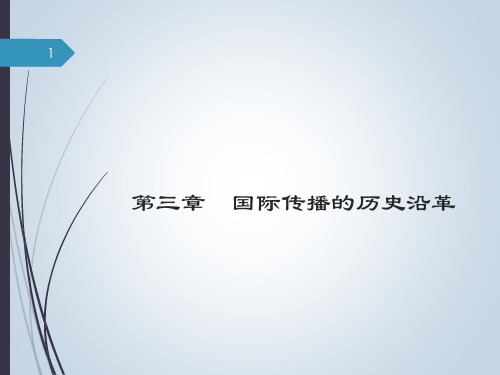
7
国际传播是以传播媒介的发展为依托的,媒介的发展水平在很大程度上决定了国际 传播的发展水平。人类最早的国际传播所采用的传播手段主要是符号媒介,包括非 语言符号和语言符号,即各种声、光信号、图画和实物标识、口语及文字 (较少使 用)。譬如,希腊历史学家希罗多德在其名著 《历史》中记载了这样一个故事:波 斯国王大流士在黑海北岸与西徐亚人交战,徐亚人派使者送来礼物,其中有一只鸟、 一只老鼠、一只青蛙和五支箭。
第四章
在以欧洲为代表的西方世界,从高卢帝国 到神圣罗马帝国,从阿拉伯帝国到奥斯曼 土耳其帝国,帝国的一次次兴衰和更替伴 随着大量信息的跨国界传递。就陆路而言, 早在古 巴比伦和古埃及时期,在帝国之内, 就出现了通过信差传递政府公文及其他信 息的通信系统。这是世界上最早的邮政系 统雏形。
更专业、更完善的邮政系统则出现在公元 前6世纪的波斯和后来的罗马帝国期间。 据记载,罗马的凯撒大帝在公元47年完 成对小亚细亚的一次征服后写下的一封简 短的新闻信:“我到、我见、我胜” ,就 是由信差传送的。
第四章
23
第三节 当代国际传播
第四章
一、互联网、手机等新媒体出现后的国际传播
24
基于互联网的信息传播功能不断显现和增强,为充分地挖掘互联网的潜力,1993年, 美国政府提出并开始实施建立 “信息高速公路”的计划。1994年3月2日美国副总统 戈尔在国际电信联盟的 “世界电信发展”大会上首次提出建立全球信息高速公路的设想。 1996年,发达国家和发展中国家代表共同参加的 “信息社会与发展”大会再次提出了 建设全球信息高速公路的计划,得到与会者的积极响应。
第四章
8 二、国际传播的早期发展
从历史上看,公元前三世纪前后,在西方形成罗马帝国和东方的秦始皇统一中国之 后,世界历史才进入到真正的帝国时期。与早期国家不同,这一时期的帝国不仅领 土面积更大,统治的人口更多,而且进行行政管辖和治理的方式也更为完备。 譬如,在欧洲,强大的罗马帝国曾经把地中海变成了自己的内湖,统治人口超过了 1亿;在亚洲,强大的汉帝国,把东亚的内陆和沿海连成一体,统治的人口也超过 了6000万。
国际传播的概念 -回复
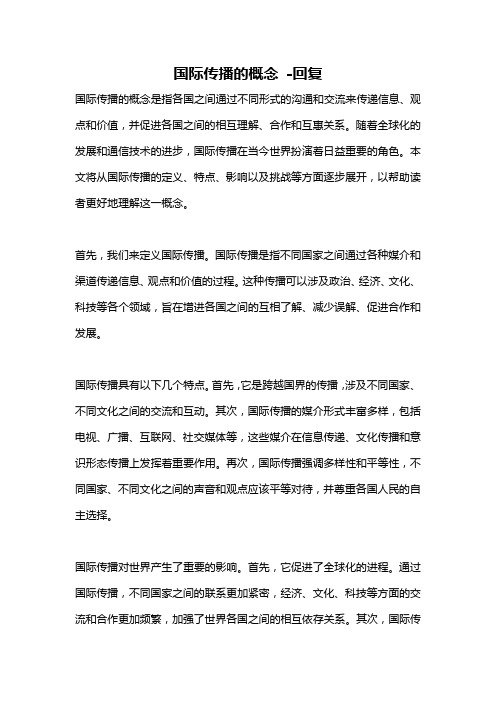
国际传播的概念-回复国际传播的概念是指各国之间通过不同形式的沟通和交流来传递信息、观点和价值,并促进各国之间的相互理解、合作和互惠关系。
随着全球化的发展和通信技术的进步,国际传播在当今世界扮演着日益重要的角色。
本文将从国际传播的定义、特点、影响以及挑战等方面逐步展开,以帮助读者更好地理解这一概念。
首先,我们来定义国际传播。
国际传播是指不同国家之间通过各种媒介和渠道传递信息、观点和价值的过程。
这种传播可以涉及政治、经济、文化、科技等各个领域,旨在增进各国之间的互相了解、减少误解、促进合作和发展。
国际传播具有以下几个特点。
首先,它是跨越国界的传播,涉及不同国家、不同文化之间的交流和互动。
其次,国际传播的媒介形式丰富多样,包括电视、广播、互联网、社交媒体等,这些媒介在信息传递、文化传播和意识形态传播上发挥着重要作用。
再次,国际传播强调多样性和平等性,不同国家、不同文化之间的声音和观点应该平等对待,并尊重各国人民的自主选择。
国际传播对世界产生了重要的影响。
首先,它促进了全球化的进程。
通过国际传播,不同国家之间的联系更加紧密,经济、文化、科技等方面的交流和合作更加频繁,加强了世界各国之间的相互依存关系。
其次,国际传播有助于增进国际间的相互理解和信任。
通过传播各种信息和观点,人们能够更好地了解其他国家的文化、价值观和发展需求,减少误解和偏见,增进友谊和合作。
另外,国际传播还可以推动全球议题的讨论和解决。
通过传播环境保护、气候变化、贫困等全球议题的相关信息,可以引起各国政府和民众的重视,共同努力解决这些问题。
然而,国际传播也面临着一些挑战。
首先,语言和文化差异是国际传播的难点之一。
不同国家之间存在着语言和文化上的隔阂,这会影响信息传递的准确性和效果。
其次,信息不对称和信息宣传的问题也是国际传播面临的挑战。
一些强势国家在国际传播中占据优势地位,在传递信息时可能更加倾向于宣传自己的观点和利益,造成信息的失衡和偏见。
国际传播力评估指标体系研究
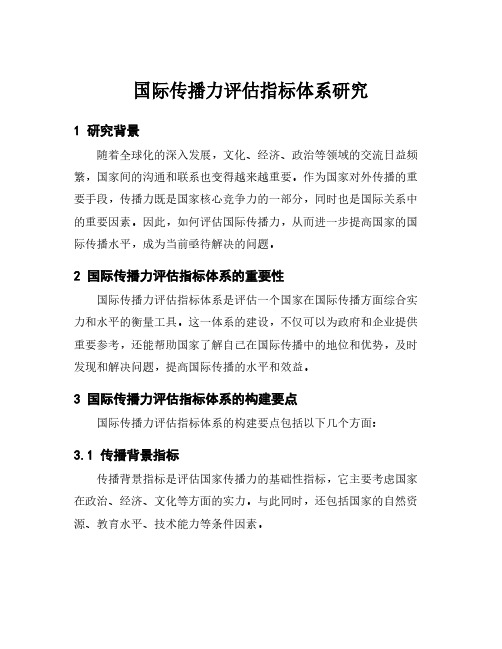
国际传播力评估指标体系研究1 研究背景随着全球化的深入发展,文化、经济、政治等领域的交流日益频繁,国家间的沟通和联系也变得越来越重要。
作为国家对外传播的重要手段,传播力既是国家核心竞争力的一部分,同时也是国际关系中的重要因素。
因此,如何评估国际传播力,从而进一步提高国家的国际传播水平,成为当前亟待解决的问题。
2 国际传播力评估指标体系的重要性国际传播力评估指标体系是评估一个国家在国际传播方面综合实力和水平的衡量工具。
这一体系的建设,不仅可以为政府和企业提供重要参考,还能帮助国家了解自己在国际传播中的地位和优势,及时发现和解决问题,提高国际传播的水平和效益。
3 国际传播力评估指标体系的构建要点国际传播力评估指标体系的构建要点包括以下几个方面:3.1 传播背景指标传播背景指标是评估国家传播力的基础性指标,它主要考虑国家在政治、经济、文化等方面的实力。
与此同时,还包括国家的自然资源、教育水平、技术能力等条件因素。
3.2 传播环境指标传播环境指标是评估国家传播力的关键性指标,它主要考虑国家应对传播的能力和应变能力。
评估指标包括新闻媒体体系、网络环境、文化氛围、传播机构等方面。
3.3 传播成果指标传播成果指标是评估国家传播力的关键性指标。
它主要考虑国家在国际传播中所取得的成果,包括国家品牌价值、国际声誉、国际影响力等方面。
这些指标是衡量国家综合实力和水平的重要标志。
4 国际传播力评估指标体系的应用案例4.1 中国国际传播力评估指标体系中国国际传播力评估指标体系是在国家发改委、外交部、国家新闻出版广电总局和中国国际广播电台等单位的支持下,由中国传媒大学和香港中文大学共同组成的课题组所开展的研究工作。
该指标以品牌形象、对外传播机构、对外传播中心、国际传播平台建设等为主要评估维度,总结了中国国际传播力的优势和不足。
此外,该指标体系还将美国、欧洲、日本、韩国等国家进行了对比,并对未来中国国际传播力的发展趋势进行了预测。
(完整)国际传播
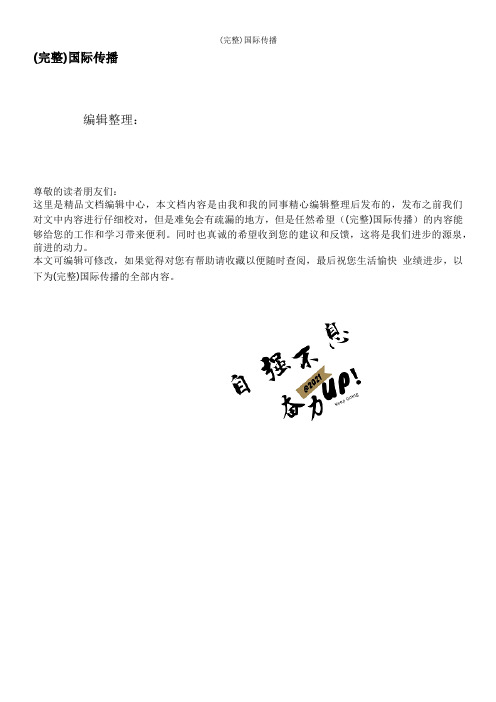
(完整)国际传播编辑整理:尊敬的读者朋友们:这里是精品文档编辑中心,本文档内容是由我和我的同事精心编辑整理后发布的,发布之前我们对文中内容进行仔细校对,但是难免会有疏漏的地方,但是任然希望((完整)国际传播)的内容能够给您的工作和学习带来便利。
同时也真诚的希望收到您的建议和反馈,这将是我们进步的源泉,前进的动力。
本文可编辑可修改,如果觉得对您有帮助请收藏以便随时查阅,最后祝您生活愉快业绩进步,以下为(完整)国际传播的全部内容。
名词解释4*51、国际传播的概念(狭义、广义)国际传播是建立在承认国家界限的基础上的国与国之间的信息传播。
广义的国际传播包括跨越国界的大众传播和人际传播.狭义的仅指跨越国界的大众传播.国际传播研究内容主要是主体研究、控制分析、内容分析、媒介分析、受众分析和效果分析.2、软实力(soft power)(谁提出、核心概念)Soft Power的概念是1990年由美国哈佛大学教授小约瑟夫·奈提出,与由经济、科技、军事实力构成的“硬实力”相对.软实力主要是指一国的文化、价值观和国民凝聚力等要素组成。
软实力强调通过精神和道德诉求,影响、诱惑和说服别国相信和同意某些行为准则、价值观念和制度安排,核心为国家影响力,主要包括文化影响力、意识形态影响力、制度安排上的影响力和外交影响力。
3、文化帝国主义理论是由美国著名学者赫伯特·席勒提出来的。
文化帝国主义理论一方面可以说是依附理论在文化层面上的延伸和深度挖掘,另一方面,它与依附理论的研究相互影响.席勒认为美国的跨国公司不断增长,主导了全球经济。
随着经济的增长,美国的国际传播能力也在快速发展,逐渐渗透到全球。
美国的商业和军事组织在以电子技术为基础的国际传播系统中取得了领导地位,籍此美国等发达国家把第三世界国家拖入了所谓的现代世界体系,并把它们的文化价值观强加给第三世界国家。
4、批判理论批判理论是指法兰克福学派理论中的文化产业论。
国际传播策划方案

2.传播渠道
(1)充分利用国际主流媒体平台,提高我国传播内容的曝光度;
(2)加强与国际知名社交媒体合作,扩大我国传播内容的传播范围;
(3)发挥我国驻外机构、海外华人华侨的作用,推动我国传播内容在当地落地生根。
3.人才培育
(1)选拔优秀传播人才,开展国际传播业务培训,提高传播团队的专业素养;
五、预期成果
1.提高我国在国际传播领域的知名度和影响力;
2.增强国际社会对我国文化、经济、政治等方面的了解和认同;
3.培养一批具有国际视野的传播人才,提升我国传播团队的整体实力;
4.推动我国与其他国家在传播领域的交流与合作,为我国在国际舞台上树立良好形象。
本策划方案旨在为我国国际传播工作提供指导,具体实施过程中需根据实际情况进行调整。在遵守我国法律法规和社会主义核心价值观的基础上,努力提升我国在国际传播领域的竞争力,为构建人类命运共同体贡献力量。
-建立人才交流机制,与国际知名传播机构开展人才互访与合作。
4.合作与联盟
-与国际传播组织建立长期合作关系,共同策划实施传播项目。
-参与国际传播研究项目,推动理论与实践的相互促进。
-定期举办国际传播论坛,促进国际传播领域内的经验分享与共识建设。
四、执行计划
1.立项准备
-开展国际传播现状调研,明确策划方案的切入点。
3.培育国际化传播人才,提高传播内容的专业性与吸引力。
4.加强与国际传播机构的合作,扩大国际交流网络。
三、策略布局
1.内容创新
-深入挖掘我国文化资源,打造具有国际传播价值的文化产品。
-紧跟国际热点,以客观、公正、权威的视角,发布及时、准确的信息。
论国际传播“五力”
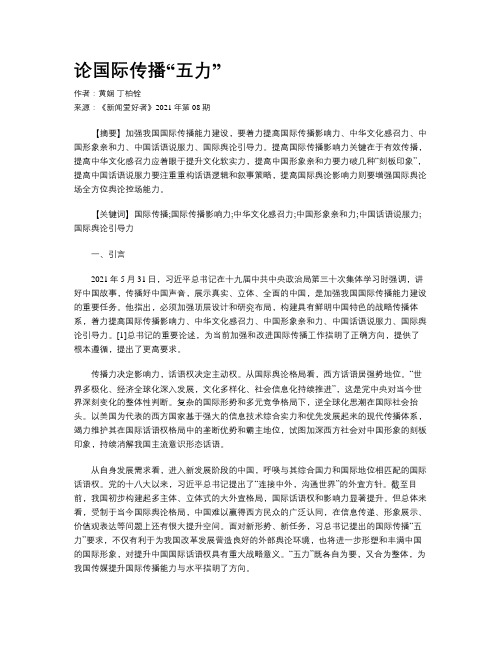
论国际传播“五力”作者:黄娴丁柏铨来源:《新闻爱好者》2021年第08期【摘要】加强我国国际传播能力建设,要着力提高国际传播影响力、中华文化感召力、中国形象亲和力、中国话语说服力、国际舆论引导力。
提高国际传播影响力关键在于有效传播,提高中华文化感召力应着眼于提升文化软实力,提高中国形象亲和力要力破几种“刻板印象”,提高中国话语说服力要注重重构话语逻辑和叙事策略,提高国际舆论影响力则要增强国际舆论场全方位舆论控场能力。
【关键词】国际传播;国际传播影响力;中华文化感召力;中国形象亲和力;中国话语说服力;国际舆论引导力一、引言2021年5月31日,习近平总书记在十九届中共中央政治局第三十次集体学习时强调,讲好中国故事,传播好中国声音,展示真实、立体、全面的中国,是加强我国国际传播能力建设的重要任务。
他指出,必须加强顶层设计和研究布局,构建具有鲜明中国特色的战略传播体系,着力提高国际传播影响力、中华文化感召力、中国形象亲和力、中国话语说服力、国际舆论引导力。
[1]总书记的重要论述,为当前加强和改进国际传播工作指明了正确方向,提供了根本遵循,提出了更高要求。
传播力决定影响力,话语权决定主动权。
从国际舆论格局看,西方话语居强势地位。
“世界多极化、经济全球化深入发展,文化多样化、社会信息化持续推进”,这是党中央对当今世界深刻变化的整体性判断。
复杂的国际形势和多元竞争格局下,逆全球化思潮在国际社会抬头。
以美国为代表的西方国家基于强大的信息技术综合实力和优先发展起来的现代传播体系,竭力维护其在国际话语权格局中的垄断优势和霸主地位,试图加深西方社会对中国形象的刻板印象,持续消解我国主流意识形态话语。
从自身发展需求看,进入新发展阶段的中国,呼唤与其综合国力和国际地位相匹配的国际话语权。
党的十八大以来,习近平总书记提出了“连接中外,沟通世界”的外宣方针。
截至目前,我国初步构建起多主体、立体式的大外宣格局,国际话语权和影响力显著提升。
《国际传播》第五章[21页]
![《国际传播》第五章[21页]](https://img.taocdn.com/s3/m/d68e28ab5acfa1c7ab00cc90.png)
Ⅰ 国家对国际传播的控制
二、国家对越境信息控制的模式
(三)半封闭半开放型
半封闭半开放型信息控制模式,是指国家对越境信息采取有条件、 有限度的控制政策,既不绝对地封锁消息,也不完全地开放信息。 采取这类有限控制或次强控制模式的国家其政治制度大多是准威权 形态的,又带有一定程度的民主主义色彩,其经济发展水平一般介 于发达国家和发展中国家之间。包括印度、巴西、阿根廷、哥伦比 亚、俄罗斯、日本、新加坡等国家。
Ⅱ 国际组织对国际传播的控制
一、作为国际传播控制主体的国际组织
(一)联合国教科文组织
联合国教科文组织成立于1946年,总部设在法国巴黎,截至2007 年,共有193个成员国。该组织以促进教育、科学、文化和信息 传播领域进行全球合作为宗旨,它从人文、社会层面关注国际传 播问题。 联合国教科文组织对国际传播的控制主要表现在建规立制、开设 论坛、发展援助和通报情况等四个方面。 联合国教科文组织以建立自由而公正(均衡)的世界新闻与信息 传播新秩序为途径,为整个人类社会的大众传播事业的发展和进 步作出了重要贡献。
Ⅰ 国家对国际传播的控制
一、国家对越境信息控制的手段
(四)信息与技术手段
所谓信息与技术手段,是指国家利用信息传播规律和信息传播技术 对越境信息传播活动非制度性、弱社会性和技术主导性。
信息与技术手段主要表现为软性和硬性两种信息控制方式:信息源 控制和技术控制。
一方面,个人对媒介的接触和控制力极大增强,受众对信息的自主 选择性显著扩大;另一方面,政府的信息控制能力则遭到严重削弱 乃至于被消解,国家的监管看起来似乎变得无效而失去意义。
国家将传播媒介整合到权力体系中的冲动始终存在,对信息的实际 控制不断借助媒介新技术来强化。在国家尚未消亡之前,国家与传 播媒介及跨国信息之间控制与反控制的关系将长期持续下去。
全人类共同价值国际传播

第1期(总第178期)2023年1月浙㊀江㊀工㊀商㊀大㊀学㊀学㊀报JOURNAL OF ZHEJIANG GONGSHANG UNIVERSITY No.1(General No.178)Jan.2023收稿日期:2022-09-21基金项目:国家社会科学基金重大项目 中国共产党百年奋斗中坚持胸怀天下经验研究 (22ZDA014)作者简介:徐艳玲,女,山东大学马克思主义学院教授,博士生导师,法学博士,主要从事马克思主义中国化研究㊂全人类共同价值国际传播:意义阐释㊁困境透视与优化路径徐艳玲(山东大学马克思主义学院,山东济南250100)摘㊀要:全人类共同价值站在世界发展与人类进步的道义制高点上,旨在打破不同国家和地域间的文化隔阂,赋能世界人民的美好生活追求,体现了新时代中国共产党人的全球视野和大国担当㊂全人类共同价值的国际传播对解构西方的 普世价值 话语霸权㊁夯实人类命运共同体构建的价值根基㊁提升中国的对外话语权和软实力等方面具有深层价值意蕴㊂当下全人类共同价值的国际传播仍面临传播环境阻滞㊁传播主体协同性不够㊁传播受众针对性不足㊁传播媒介影响力不强等多元困境㊂为此,应通过优化国际传播环境㊁整合国际传播主体㊁对国际传播受众进行细分和策略选择㊁打造国际传播媒介矩阵等多维路径协同推进,全面提升全人类共同价值国际传播效能㊂关键词:全人类共同价值;传播环境;传播主体;传播受众;传播媒介中图分类号:D820㊀㊀文献标志码:A㊀㊀文章编号:10091505(2023)01000510DOI:10.14134/33-1337/c.2023.01.001习近平总书记在第70届联合国大会的讲话中指明: 和平㊁发展㊁公平㊁正义㊁民主㊁自由,是全人类的共同价值,也是联合国的崇高目标㊂ [1]此后,习近平总书记先后多次在重要场合阐释全人类共同价值的深刻内涵与重要意蕴㊂党的二十大报告进一步强调, 世界各国弘扬和平㊁发展㊁公平㊁正义㊁民主㊁自由的全人类共同价值,促进各国人民相知相亲 [2]63,这体现了中国共产党人在价值层面上回应世界各国人民美好生活期待的全球视野与大国担当㊂目前学界围绕全人类共同价值的议题进行了一定的探讨,但对其国际传播维度的研究阐释相对滞后,因而亟须对全人类共同价值国际传播的议题进行 深耕 ,在阐明全人类共同价值国际传播意义的基础上,透视其多元困境,探究其优化路径,以推动全人类共同价值的共识达成,从而持续地㊁稳定地为构建人类命运共同体奠定价值观层面的基础,并为实现中华民族伟大复兴的宏大叙事创造良好的外部环境㊂一㊁全人类共同价值国际传播的意义阐释全人类共同价值具有鲜明的世界意蕴与全球指向,旨在打破不同国家和地域间的文化隔阂,融合6浙㊀江㊀工㊀商㊀大㊀学㊀学㊀报2023年各种 异质性 价值理念的共性部分,塑造其 同质性 价值㊂全人类共同价值国际传播对于打破西方的 普世价值 话语霸权,夯实人类命运共同体构建的价值根基,以及提升中国的对外话语权和软实力,均具有极强的现实意义与深远影响㊂(一)有助于解构西方的 普世价值 话语霸权长期以来,由于资本逻辑的牵导, 西方中心主义 随着资本主义生产方式的全球扩张不断形塑,大大阻滞了世界各国摒弃零和博弈㊁实现合作共赢的历史大势㊂这突出表现为某些西方大国擅长使用 包装 成 公共产品 的㊁易受国际社会广泛认同和接受的价值理念来生产话语㊁阐释话语㊁强化价值认同㊂如把自我价值主张巧妙包装成 普世价值 ,把一切侵略㊁损害他国的帝国主义行径粉饰成 维护世界和平 ,并以此确立自己的价值立场和话语体系,呈现为极力向世界推广西方文化和精神信仰的价值扩张现象,具有明显的价值输出单向度㊁强制性特点㊂事实上, 普世价值论 是西方价值观对世界各国本土文化渗透的突出表征,是西方国家维护其国际社会意识形态统治权㊁话语权的工具,其真实意图是凭借自身话语权的主导地位,将经济㊁政治㊁文化㊁军事㊁科技力量等竞争加以意识形态化,将反映自己特殊利益的价值 普世化 ,以达到固化西方主导的世界经济政治模式㊁排除非西方力量生长㊁使资本主义制度永固的特定价值诉求[3]㊂在全球化背景下,世界人民长期浸润在西方思维方式㊁表达方式下,使全人类共同价值的国际传播和认同遭受严重阻滞㊂当国际场域中以 和平㊁发展㊁公平㊁正义㊁民主㊁自由 为内容要素的全人类共同价值的传播与长期以来西方 普世价值论 的扩张相遭遇时,就难免产生碰撞㊁激荡和严重冲突㊂虽然近年来, 人类命运共同体 一带一路 等中国倡议㊁中国理念㊁中国智慧得到了世界上越来越多国家的正面 回应 ,但也面临不少误读,如中国 和平崛起 的概念本为展示 和平 的初衷,而在国际传播场域中 崛起 一词反而得到更多关注,仿佛给 中国威胁论 以 口实 ;中国建立公正合理的国际政治经济新秩序的主张,也往往被误读为对西方主导的现有国际秩序的挑战;以 人权 为核心打 民主自由 牌更是一些西方国家的惯用伎俩,疫情当前不仅将中国坚持人民生命健康至上的防疫政策错误解读为 限制人身自由 ,甚至无视新疆地区消除贫困与经济发展的巨大成就,炮制了所谓中国在新疆侵犯 自由 和 人权 等天方夜谭的谎言㊂在西方国家的误读㊁抹黑下,中国以历史性变革和历史性成就为表征的发展优势以及中国的制度优势难以转化为国际层面的话语优势,国际秩序的制定权㊁评价权和国际话语的主导权㊁操控权依然掌握在西方发达国家手中㊂以美国为代表的一些西方发达国家以自身利益为出发点,以自身话语标准作为衡量是非曲直的标准,利用 普世价值 标尺恶意裁剪中国的政策和制度,蓄意挑起摩擦,制造不断升级的 中国威胁论 版本,使国际舆论陷入其故意设计的话语陷阱,意图使我国陷入 有理说不清 的话语困境㊂在这种情势下,全人类共同价值国际传播对于回击西方国家对中国的无端指责㊁消解其他国家对中国的认知偏差具有深度意义㊂一方面,中国提出的全人类共同价值是站在道义的制高点上,对多元文化语境下 世界怎么了㊁人类向何处去 作出的价值回应,凸显了 和平与发展是我们的共同事业,公平正义是我们的共同理想,民主自由是我们的共同追求 [4],具有对话协商㊁合作共赢㊁共享共建㊁可持续发展等价值表征,充分适应了全球文明多样性的发展态势,是以价值形态对全人类文明进步㊁命运与共关系的自觉呈现㊂另一方面,全球化时代,每一种文明都不能封闭自己,只有在与其他文明的交流中才能焕发出发展活力㊂全人类共同价值倡导的 和平㊁发展㊁公平㊁正义㊁民主㊁自由 价值理念能够以更加包容㊁存异㊁欣赏的态度对待不同文明,减少了不同文明因差异而产生的误会与摩擦,回应了世界各国人民的共同价值期待㊂从这一意义上说,全人类共同价值以鲜明的价值自觉助力打破西方 普世价值 的话语垄断,不啻为对西方意识形态话语霸权的强力解构㊂(二)有助于夯实人类命运共同体构建的价值根基和平㊁发展㊁公平㊁正义㊁民主㊁自由 的全人类共同价值体现了人类命运共同体的价值诉求,其最终实践指向是构建人类命运共同体㊂ 当前,世界之变㊁时代之变㊁历史之变以前所未有的方式展开㊂ [2]60世界百年未有之大变局与世纪疫情叠加,各个民族㊁国家的相互依存性空前加深,世界各国的追求理应由自身利益向共同利益转变,走向人类共同命运成为必然趋势, 构建人类命运共同体是世界各国人民前途所在 [2]62㊂由此,人类命运共同体理念作为一种超越民族国家范畴的全球观念,体现了中国对美好世界的向往和为世界解决难题的天下情怀,也为人类发展和社会进步提供了一种新思路㊂然而,由于各国文化背景不同,构建人类命运共同体在具体实践中往往遭遇价值理念多元化的困扰㊂从根本上来说,构建人类命运共同体需以世界人民的共同利益为出发点,蕴含着世界各国在价值观念㊁奋斗目标㊁实践路径等方面达成总体一致的要求,其基本前提就是实现价值观念的融通性㊂而全人类共同价值凝结了普遍性价值的最大公约数,超越了文化壁垒,博采了众家之长,从世界各民族的长期历史实践中汲取了经验, 促进了人类价值观的里程碑式升华 [5],是当前国际社会交往中应遵循的重要价值伦理㊂质言之,作为阐释人类文明前进方向的中国方案,人类命运共同体理念自始就主张人类文明之间相互尊重㊁相互包容以实现和谐共荣,主张世界各国的集体参与㊁责任共担㊁优势互补和利益共享㊂这一主张需要以全人类共同价值为价值统摄,使世界各国在采取全球行动时把思维和行动框定在合理区间内㊂从历史之维看,从世界大战的惨烈到美苏冷战的对抗,再到和平与发展逐渐演变为时代主题,彰显着人类社会对世界和平与安定的时代期许㊂从现实之维看,各国人民对和平发展的要求更加迫切,对公平正义的期盼更加强烈,对民主自由的呼唤更加真切㊂由此,全人类共同价值通过国际传播,可助推全球范围内不同国家之间达成广泛的 共同体 意识,从而最大限度地凝聚世界各国力量,增强各国在人类命运共同体构建中的归属感,推动全人类共同价值在世界各地 落地生根 ㊂在 你中有我㊁我中有你的命运共同体,利益高度融合,彼此相互依存 [6]的今天,全人类共同价值作为人类命运共同体的合理价值内核,将使人类在面对共同挑战时有 星空 可仰望,赋能世界人民的美好生活追求,也有助于实现国际社会的和平㊁稳定与发展㊂(三)有助于提升中国的对外话语权和软实力全人类共同价值着眼于人类整体性的生存利益和道德诉求,凝聚了世界各国人民的基本价值共识;植根于中华民族五千多年的历史文明实践和中华民族的多元一体格局,汲取了几千年中华文明的智慧成果㊂中华文明在长期的历史演进过程中形塑了自己的文化特质,也形成了一些包含普遍性意涵的思想和价值观念,深刻影响了中华文明的演进逻辑㊂而中华文明蕴含的价值观念贯穿了国家政治㊁家庭伦理㊁社会秩序㊁个人发展以及精神世界等各个领域,本身就是一个完整自洽的价值体系[7]㊂全人类共同价值是对中华文明内蕴的 崇仁爱㊁重民本㊁守诚信㊁讲辩证㊁尚和合㊁求大同 [8]等价值观念的创造性转化和创新性发展,体现了中华文明独特的精神标识和文化精髓㊂从这一意义上说,全人类共同价值内蕴着中华文明的价值特质,凝练着中华优秀传统价值观和社会主义核心价值观的精华,体现了中国对解决世界问题的基本价值态度,向全人类传达出平等协商㊁和平发展的国际政治话语,合作共赢㊁共同繁荣的国际经济话语,共建共享㊁普遍安全的国际安全话语,交流互鉴㊁兼容并蓄的国际文化话语,环境清洁美丽㊁可持续发展的国际生态话语,体现了人类追求共同价值的话语基点,彰显出 各美其美㊁美人之美㊁美美与共㊁天下大同 [9]的价值特征㊂全人类共同价值巧妙并有效地将中国的核心价值理念㊁世界人民的共同诉求以及人类的前途命运有机融合,强调尊重文明多样性,强调 以文明交流超越文明隔阂㊁文明互鉴超越文明冲突㊁文明共存超越文明优越 [2]63,植根于世界各国彼此依赖和人类拥有共同的普遍的生产生活实践的历史环境,顺应了经济全球化的发展潮流,致力于人类面临的全球性问题的求解,助力世界秩序因和平交往而更加稳定,全球性问题因通力合作而更加易于解决, 让各国人民更加幸福,让世界更加美好 [10]㊂从这一意义上说,7第1期徐艳玲:全人类共同价值国际传播:意义阐释㊁困境透视与优化路径㊀8浙㊀江㊀工㊀商㊀大㊀学㊀学㊀报2023年全人类共同价值具有前瞻性和包容性,为人类文明的交流互鉴提供了原则遵循㊁价值标准以及目标导向,同时也彰显了中华文明在人类文明形态中的独特性和优越性,扩大了中华文化和中国价值理念的影响力,有助于提升中国的对外话语权和软实力㊂二㊁全人类共同价值国际传播的困境透视自2015年 全人类共同价值 的概念提出至今,习近平总书记在多个国际国内场合重申或倡议全人类共同价值,其价值内涵由此得到了广泛阐扬㊂同时要看到,全人类共同价值的国际传播也面临多元困境㊂(一)全人类共同价值的国际传播环境仍面临阻滞全人类共同价值的传播以全球为空间场域,理想的全球化生态是全人类共同价值国际传播的助力㊂但现实的全球化生态仍是资本主义主导的全球化,其造成的经济发展不平衡㊁ 逆全球化 思潮汹涌,以及国际社会意识形态的对立等成为全人类共同价值传播的阻滞因素㊂一是世界经济发展不平衡成为全人类共同价值国际传播的制约㊂实现全人类共同价值与国家实力密切关联,需要世界各国具备坚实的经济基础,然而受世界百年未有之大变局与世纪疫情叠加等因素的限制,各国在全球经济格局中的地位不尽相同㊂西方发达国家凭借其自身优势,长期占据世界经济的金字塔顶端,而落后国家受到国内外多种因素制约,经济发展严重受阻,也在一定程度上拉大了各国之间的贫富差距,这使得处在不同经济发展水平层级的国家各有不同的阶段性主题和发展目标㊂对于一些深陷贫困桎梏的不发达国家来说,人民的生存都无法获得基本保障,公平㊁正义㊁自由等普遍性价值也在一定程度上受到了抑制㊂质言之,和平的国际国内环境是经济发展的基本前提,不发达国家也有实现美好生活的价值诉求,然而贫富差距拉大以及国内政治动荡又影响了经济发展与普遍性价值的追求,如此反复陷入恶性循环之中,严重削弱了实现全人类共同价值的经济根基㊂二是 逆全球化 思潮汹涌影响了和平㊁发展㊁公平㊁正义等全人类共同价值的实现㊂美国作为当前世界上唯一的超级大国,却奉行贸易保护主义和霸权主义,试图以阻碍全球化的发展来维护自身的特殊利益,而不是谋求全球共同发展㊂在欧洲,英国作为曾经重要的欧盟成员国却公投脱欧,乌克兰危机的 溢出 效应牵一发而动全身,不仅影响了世界经济的发展,也深刻影响了和平㊁公平㊁正义等普遍性价值的实现㊂从这一意义上说, 逆全球化 思潮汹涌不仅严重威胁世界经济平稳运行,阻碍全球化进程的正向运动,而且影响各国人民正常的生产生活秩序,使人民的安全感大大降低,各国之间的信任感和依赖感受损,对全人类共同价值的传播和国际认同产生消极影响㊂三是国际社会意识形态的对立不断挤压全人类共同价值的认同空间㊂意识形态的对立始终是世界各国难以跨越的一道坎儿㊂当今世界的意识形态对立并非当下瞬时形成的,而是传统意识形态对立的不断延续,至今仍未从本质上祛除其历史影响㊂自冷战结束后的 历史终结论 与 文明冲突论 始,西方国家意识形态的战略考量逐渐侵蚀掉了应有的认知理性㊂而今,在现有的国际传播格局中, 西方文明优越论 被大肆渲染,零和博弈㊁冷战思维等陈旧观念的影响使部分西方国家一直致力于将自己的价值观念渗透于与其政治制度㊁价值观念具有异质性的国家或地区,高高在上地干涉他国内政[11]㊂在本国出现经济或社会问题时,一些西方国家会将自己的危机通过战争㊁贸易等手段转嫁给国际社会,引发国际矛盾,削弱国际合作的根基,对全人类共同价值的传播和认同造成严重阻滞㊂因而,目前全人类共同价值在与世界各国本土文明融合的过程中,还有相当大的文化壁垒和樊篱需要克服,从价值理念到走向实践还有漫长的征程需要跨越㊂(二)全人类共同价值国际传播主体的协同性不够从全人类共同价值国际传播的主体看,大致可分为官方传播主体㊁学术传播主体以及大众传播主体三大类,各个主体虽传播侧重不同,但目标一致㊂目前,相同类型的传播主体整合性不足,不同类型的传播主体协同性不够,导致各传播主体难以形成强大的传播合力㊂一是以官方为主体的传播主体相对单一㊂从当下的传播状况看,全人类共同价值的传播是以官方为主体,尤其以首脑外交㊁官方媒体㊁党报党刊等官方性质的传播为主,这是由全人类共同价值提出的话语主体所决定的㊂官方传播主体因其所特有的权威性与准确性,在全人类共同价值的国际传播中具有不可替代的作用,但其固有的身份与话语特色也带来了一些难以克服的困难㊂一方面,官方传播主体的政治性导致话语风格的严肃性,这使得话语在形式上相对呆板,灵活度不够㊂另一方面,意识形态的差异甚至对立使得部分西方政客对中国官方提出的话语存在一定的抵触情绪,甚至蓄意曲解㊂总体来看,以官方为主体进行对外宣传虽有一定效果,但也可能被一些国家误读为 政治说教 ,使国外受众产生抗拒㊁排斥心理,对全人类共同价值的传播和认同产生消极影响㊂二是学术传播主体综合性不够㊂学术传播主体是全人类共同价值国际传播的智力支持,其主要使命既包括全人类共同价值的深度学理阐释,增强价值理念的说服力与感召力,也包括国际传播的相关技术支撑,助力提升价值传播的行动力㊂全人类共同价值国际传播学术任务的多学科性决定了学术传播主体的多样性,既需要马克思主义理论学科㊁政治学科的学术团队进行战略考量,也需要语言学㊁传播学的学术团队予以技术支持㊂从目前情势看,全人类共同价值的学理阐释以及与 普世价值 争鸣的学术研究取得了一定效果,但 大传播 学科的学术 深耕 相对不足, 大传播 团队建设相对滞后,特别是具有扎实外语基础㊁兼通中西文化㊁热心传播中华优秀文化的复合型优秀人才相对匮乏,这在很大程度上影响了国际传播效能㊂三是大众传播主体关联性不足㊂大众传播是全人类共同价值国际传播的民间主体,且其灵活性㊁互动性以及生活性的话语特征具有天然的亲和力,但也正由于其话语特征使得全人类共同价值在国际传播过程中带有很大的随意性㊂一方面,活跃在国际社交媒体上的群体大多是在外留学㊁务工者,华裔华侨以及作为市场主体的外贸企业等,数量较少且主体间关联不强㊂另一方面,由于大众传播主体的类型多样,且能力水平各异,也为主体间实现有效沟通与整体协同带来诸多困难㊂何况,关于全人类共同价值的话题容易湮没在娱乐事件㊁经济摩擦等更有噱头的话题中,难以形成全球性的广泛讨论㊂这一现状使大众传播既难以发挥每个个体的传播效能,也难以培育出具有相当影响力的意见领袖或网络大V,无形中会削弱全人类共同价值国际传播的广度㊂(三)全人类共同价值国际传播受众的针对性不足作为全人类的共同价值,其传播对象必然是人类整体,但要注重传播受众的差异性㊂全人类共同价值在国际传播的过程中,经常将其所有内涵 打包 在一起,对不同传播受众平均用力,这导致了其传播的针对性不足㊁精准度不高,使传播与认同的效能大打折扣㊂一是西方设置的传播障碍使传播受众具有差异性㊂意识形态的差异使部分西方国家对中国的国际行为采取一贯曲解的态度,更有甚者出现了逢 中 必反的现象㊂不仅如此,一些西方国家在这方面可谓煞费苦心,在涉 中 议题上充分把握受众的切身利益与需求,以求达到 污名化 中国的效果㊂例如,在中国周边极力鼓噪 中国威胁论 ,特别是 军事威胁论 ,使得周边国家始终对中国的发展保持警惕;在发展中国家大力宣传 新殖民主义 ,将中国倡议的 一带一路 有意解读为中国版的所谓的 马歇尔计划 ;在发达国家不仅以 修昔底德陷阱 渲染 国强必霸 逻辑,还以民主㊁自由等概念的垄断权谴责中国对 普世价值 的 违背 ;等等,不一而足㊂从全人类共同价值的维度来看,以上做法使得西方世界在中国周边国家重点消解中国的和平㊁发展作为,在发展中国家有意忽略中国的公平㊁正义倾向,在发达国家着力批判中国所谓的 不自由㊁不民主 ㊂面对 西强东弱 的国际传播格局以及西方塑造的国际舆论特点,全人类共同价值的 打包 传播,会因差异性不足㊁重点不突出而降低传播9第1期徐艳玲:全人类共同价值国际传播:意义阐释㊁困境透视与优化路径㊀01浙㊀江㊀工㊀商㊀大㊀学㊀学㊀报2023年效能㊂二是全人类共同价值在传播过程中对中国外交方针的对象差异性也重视不足㊂在外交政策方面,中国在强调同世界各国发展友好合作的同时,也针对不同的对象采取不同的策略㊂例如对周边国家坚持亲诚惠容的方针,在深度利益融合中加强友好互信;对发展中国家坚持真实亲诚的理念,突出正确的义利观;与大国构建 和平共处㊁总体稳定㊁均衡发展 的关系格局,有效避免了此消彼长㊁你输我赢的大国争霸模式㊂全人类共同价值虽然不同于外交政策,但在价值观层面上具有共通性,在目标受众上具有重叠性㊂由于全人类共同价值的提出者是中国,传播对象对中国的态度以及与中国的关系,直接影响到对中国提出的全人类共同价值的接受度与认可度㊂从目前的现状看,全人类共同价值的国际传播过于强调价值内涵的人类性与传播对象的全球性,对传播对象的差异性重视不足,降低了全人类共同价值国际传播的精准度㊂三是全人类共同价值不同要素的认知在受众数量上也具有一定的差异性㊂正如调研数据所显示的 和平㊁发展获积极认可,公平㊁正义受广泛认同,民主㊁自由还有认同提升空间 [12]㊂究其原因,是全人类共同价值的不同内涵对应着人类需求的不同层次,需求层次越低,受众群体越广㊂例如,和平㊁发展因其需求的基础性而具有最广泛的受众群体,因而认可度也最高;公平㊁正义作为发展性需求与人类的美好愿景相符也具有较高的认可度;而民主㊁自由则受国家间意识形态的不同影响存在较大的理解差异㊂事实上,无论是受众对象上的差异还是受众数量上的差异,皆源于全人类共同价值的内容供给与对象需求之间的契合度,这也是影响其国际传播效度的主要归因㊂(四)全人类共同价值国际传播媒介的影响力不强从全人类共同价值国际传播的媒介看,既需要语言媒介的转换,也需要技术媒介的融合㊂目前,这两个环节都存在不同程度的障碍,致使全人类共同价值国际传播的 流量 递减㊂一是传播语言的多元性㊁准确性不足㊂价值的传播需要用语言呈现出来, 西方标准㊁西方术语长期主导着中国乃至世界的翻译和学术交流 [13], 普世价值 的广泛传播与英语作为全球通用的语言是分不开的㊂全球范围内的思想㊁语言交流以英语为主,不同语言的隔阂㊁文本的翻译极易出现信息不对称㊁对中华文化元素翻译不准确的现象,稍加不慎就可能会坠入西方的话语陷阱㊂中文的传播广度相较于英文来说还处在劣势,不利于全人类共同价值的传播,翻译不精准也加大了全人类共同价值认同的难度㊂例如, 全人类共同价值 在进行中文传播时,概念界定清晰,属于专属名词㊂而在进行对外传播时,英语翻译为 The shared human values 或 The common values of humanity 只能表示其大概含义,甚至 shared 的 分享性 与 common 的 共同性 在对同一对象的表达时本身就存在歧义,在传播过程中就会造成更大的偏差㊂如果说语言转化在技术层面相对简洁的话,那么语言背后的文化转化则更为复杂,语言媒介转换的实质是文化对接㊂特别是对于 中华文明 而言,不仅存在其与 伊斯兰文明 基督教文明 及 非洲文明 等一般性差异,还存在 东方文明 与 西方文明 的特殊性冲突,这进一步加剧了语言转化的难度㊂由此可见,全人类共同价值 二次编码 的语言损耗和文化折扣是其国际传播的认知性障碍㊂二是传播平台往往受到西方打压限制㊂信息传播技术的发展形成了 多媒介性 的特征, 多媒介性 产生了 媒介融合 的需要,平台化是媒介融合在物质技术层面的最大特征,产业化是媒介融合在社会组织结构上的显著特点㊂从全球传播看,以市场为导向的媒介融合趋势使得中国许多传播平台受到西方打压㊂当前西方主流媒体的新闻发稿量占比巨大,例如 美国主要新闻媒体发布的信息量是世界其他国家发布的总信息量的100倍,世界上75%的电视节目和60%的广播节目是由美国生产和制作的 [14]㊂因此,西方媒体特别是美国媒体在世界媒体中的寡头地位,使得海外受众获取中国信息主要依靠西方媒体,仅有少部分人通过中国媒体获取信息㊂目前海外主流社交媒体推特㊁脸书都归属于美。
推动主题出版高质量走出去,提升中国文化国际传播能力——以中国人民大学出版社为例

22推动主题出版高质量走出去,提升中国文化国际传播能力——以中国人民大学出版社为例文/郭晓明 徐小玲【摘 要】讲好中国故事,传播好中国声音,展示真实、立体、全面的中国,是加强我国国际传播能力建设的重要任务。
《出版业“十四五”时期发展规划》将“出版走出去取得新成效”作为“十四五”六大目标之一。
面对世界百年未有之大变局和全球新冠肺炎疫情的影响,中国文化如何迎接挑战,进一步提升国际传播能力,实现高质量发展,成为摆在所有出版人面前的重大理论和现实问题。
中国人民大学出版社精耕出版主业,以精品主题出版、学术出版为抓手,利用版贸资源优势,探索出了一条适合自身发展、具有鲜明特色的新时代出版走出去之路。
【关 键 词】主题出版;走出去;文化传播【作者单位】郭晓明,中国人民大学出版社;徐小玲,中国人民大学出版社。
【基金项目】本文系中国人民大学研究报告《“一带一路”共建国家出版合作研究报告(2021)》研究成果。
【中图分类号】G239.2 【文献标识码】A 【DOI】10.16491/45-1216/g2.2022.11.004一、 聚焦一个中心:大力推动研究习近平新时代中国特色社会主义思想相关著作走出去习近平新时代中国特色社会主义思想是当代中国马克思主义、二十一世纪马克思主义,是中华文化和中国精神的时代精华,实现了马克思主义中国化新的飞跃[1]。
加强习近平新时代中国特色社会主义思想国际传播是重大而紧迫的政治任务。
习近平新时代中国特色社会主义思想是中华文化和中国精神的时代精华,结合理论和实践讲清楚了中国共产党为什么能、中国特色社会主义为什么好,这一重要思想根植中华文明沃土,立足时代发展潮头,从经济、政治、文化、社会、生态文明等多个视角系统展示了中国式现代化新道路,回应了人类社会面临的新挑战,主动观照全人类的共同价值,在国际社会凝聚共识、引发共鸣[2]。
因此,党的十八大以来,中国人民大学出版社聚焦走出去中心工作,始终把积极推动研究习近平新时代中国特色社会主义思想精品著作的翻译出版作为走出去工作的重中之重。
《传播学》(第三版)邵培仁 传播学概论高教版第3讲
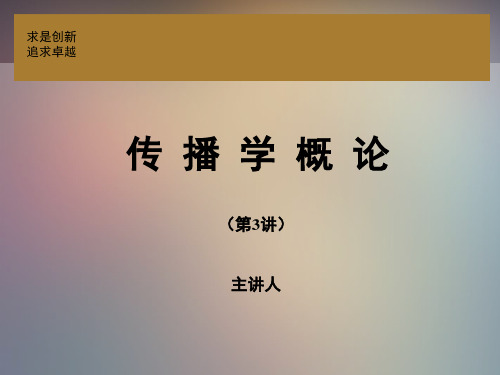
◊全球传播包含了更为多元的对象以及更为复杂的跨文化关系。那么 在当今全球传播中我们需要注意哪些问题? (1)跨国界的传播者总是或多或少地承载着其自身国家印象,成为国 家的代言人;(2)全球传播是不同国家、不同种族、不同文化之间的 信息交流,有效的传播总是建立在彼此全面、正确的了解基础上;(3) 信息流通不平衡,媒介地理不平坦,发达国家与欠发达国家在信息交 流中是不对等的;(4)西方媒介强国对欠发达国家的民族文化构成威 胁,具有破坏性;(5)网络和新媒体的迅猛发展正在改变传统的信息 资源和社会资源流动和分配方式。
革命历程呈 现的形态
◊从五次传播革命与社会进步的互动关系来看,我们认为传播革命对社 会进步具有巨大的推动作用。 1.每一次传播革命的爆发都为人类的生存与发展带来新的机遇,开拓了 新的空间; 2.每一次传播革命都不可避免的形成所谓“信息沟”或“知沟”,形成 新的传播或接受信息和知识的不公平,出现精神世界里的“富人”和 “穷人”。 3.人类传播革命与社会文明进步不仅互相促进而且步调一致,在步幅和 步频上基本上成正比例关系。 4.最先发生传播革命的地方或国家,不仅社会进步和文明程度高,而且 在竞争中也处于明显的优势地位; 5.传播上的优势地位必然会导致文化上的优势地位,因此在发达国家的 文化侵略面前,弱小国家几乎没有还手之力。
第二章 传 播
本章学习目的和要求
掌握人类传播史上发生的五次传播革命的性质及意义,了 解传播模式的概念、功能、标志以及应用模式进行研究的 三个原则,知道传播的特点和种类,掌握传播在组织和社 会层面的功能以及传播者必须遵循的传播原则。
◊只要人类对世界心存疑问,他们就一定会对人性的神秘充满好奇。
◊传播,是人类发展史上最神秘、最富有人性的独特现象。它无处不在, 无时不有;它与人类朝夕相处,如影相随,居于人类生活的中心。
- 1、下载文档前请自行甄别文档内容的完整性,平台不提供额外的编辑、内容补充、找答案等附加服务。
- 2、"仅部分预览"的文档,不可在线预览部分如存在完整性等问题,可反馈申请退款(可完整预览的文档不适用该条件!)。
- 3、如文档侵犯您的权益,请联系客服反馈,我们会尽快为您处理(人工客服工作时间:9:00-18:30)。
• The Tudors and Stuarts maintained that the press belonged to the office of king and therefore was obligated to support the royal policy. Only by special permission was private ownership of the press permitted, and this permission could be withdraw any time the obligation to support the royal policies was considered to have been dishonored. Publishing was thus a sort of agreement between power source and publisher, in which the former granted a monopoly right and the latter gave support. But the power source kept the right to set and change policy, the right to license, and in some cases the right to censor.
施拉姆等四种理论
《报刊的四种理论》 Four Theories of the Press
Fred Siebert, Theodore Peterson, Wilbur Schramm
Four Relations For The Mass Media
• Press all the media of communication • Aim of the book why does it apparently serve different purposes and appear in widely different forms in different countries? ① the differences the ability of a country to pay for its press, the mechanical ingenuity and resources that can be put behind mass communication, and the relative degree of urbanization which makes the circulation of mass media at once easier and more necessary ② the differences in the press of different countries reflect simply what people do in different places and what their experience leads them to want to read about. Basic reason the press always takes on the form and coloration of the social and political structures within which it operates.
• It reflects the system of social control whereby the relations of individuals and institutions are adjusted. social systems in which the press functions • certain basic beliefs and assumptions which the society holds 1 the nature of man, 2 the nature of society and the state, philosophy 3 the relation of man to the state, 4 the nature of knowledge and truth • Four theories • Authoritarian theory Soviet Communist theory Libertarian theory Social Responsibility theory the latter two are merely developments and modifications of the first two
Ⅰ Authoritarian theory
• Period of time came into being in the authoritarian climate of the late Renaissance, soon after the invention of printing universally accepted in the 16th and 17th centuries • Basic philosophy truth was conceived to be, not the product of great mass of people, but of a few wise; man who were in a position to guide and direct their fellows. Truth was thought to be centered near the centre of power. Thoughts from Plato to Machiavelli • Press system functioned from the top down privately owned The rulers of the time used the press to inform the people of what the rulers thought they should know and the policies the rulers thought they should support. • The press being a servant of the state responsible for much of its content to the power figures in charge of government at any given moment eliminated the most common press functions: to check on government
国际传播学 之四
透视国际传播: 透视国际传播: 国际传播体系
北京语言大学 新闻系 郭之恩
国际传播体系
• 各国的媒体体系、各国政治和政府之间的 关系 • 涉及各国政治体制和政治理念
几种理论: 几种理论: • • • • • • 1、施拉姆等四种理论 2、哈希顿的五种理论 3、阿特休尔三个世界 4、卡尔·诺登斯特伦五种范式 5、丹尼斯·麦奎尔民主参与理论 6、罗伯特·皮卡德民主社会主义理论
Ⅱ Libertarian theory
• Period of time the growth of political democracy and religious freedom, the expansion of free trade and travel, the acceptance of laissez-faire economics, and the general philosophical climate of the Enlightenment, undermined authoritarianism. Be incipient in the late 17th century, came into real being in the 18th century, and flowered in the 19th century. Basic philosophy man is no longer conceived as a dependent being to be lead and directed, but rather as a rational being able to discern between truth and falsehood, between a better and worse alternative, when faced with conflicting evidence and alternative choices. Truth is no longer conceived of as property of power. Rather, the right to search for truth is one of the inalienable natural rights of man. Thoughts from Milton, Locke, Mill and the Enlightenment Press system a partner in the search for truth The press is not an instrument of government, but rather a device for presenting evidence and arguments on the basis of which the people can check on government and make up their minds as to policy. It is imperative that the press be free from government control and influence. In order for truth to emerge, all ideas must get a fair hearing; there must be a “free market place” of ideas and information. Minorities as well as majorities, the weak as well as the strong, must have access to the press.
